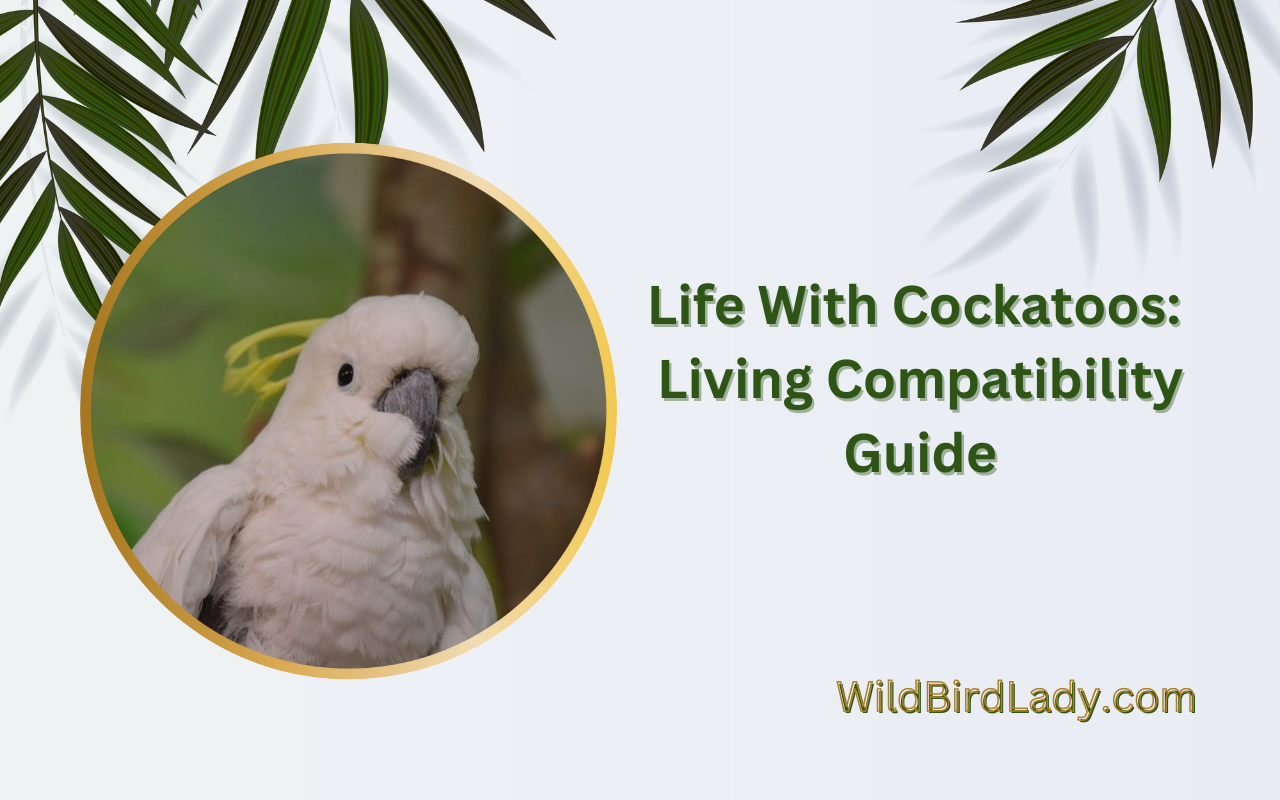Cockatoos can live with other cockatoos but cannot live with other bird species due to territorial behavior and aggression. Cockatoos are affectionate and intelligent birds that make great companions for dedicated owners.
So, you’re thinking of inviting a feathered friend into your life, huh?
Well, buckle up and grab a bag of peanuts because you’re in for a wild ride! These charismatic creatures are known for their intelligence, mischief, and flair for drama that would put Shakespeare to shame. But fret not, dear reader, for we’ve got you covered.
In this guide, we’ll reveal the secret art of harmonious cohabitation with these feathery divas. Ready to dive into the fabulous world of cockatoos? Let’s flap our wings and soar together!

Credit: www.herebird.com
Preparing For A Cockatoo
Life With Cockatoos: a lady’s guide to improper behavior
Have you ever considered adding a cockatoo to your household? These intelligent and social birds can make excellent pets, but living with a cockatoo also requires careful preparation and understanding of their unique needs. In this guide, we will explore how to prepare for life with a cockatoo and provide tips on how to create a safe and stimulating environment for your feathered friend.
Choosing The Right Type Of Cockatoo For Your Lifestyle And Environment
Choosing the right type of cockatoo is an important first step towards ensuring a successful life with a pet bird. Here are some key points to consider when selecting a cockatoo:
- Species: There are several species of cockatoos, each with their distinct personalities and care requirements. Some are more suitable for first-time bird owners than others. Research the different species and their characteristics to determine which one is right for you.
- Lifespan: Cockatoos can live for several decades. Consider whether you are prepared for the long-term commitment of caring for a pet bird.
- Space: Cockatoos need ample space to move around and play. Consider the size of your living space and whether it can accommodate a large birdcage or aviary.
- Noise level: Cockatoos are known for their loud vocalizations, which can be a source of annoyance for neighbors. If you live in an apartment or have close neighbors, consider a species of cockatoo that is less vocal.
Understanding The Social And Emotional Needs Of Cockatoos
Cockatoos are highly social birds that require a lot of attention and interaction. Here are some tips for meeting your cockatoo’s social and emotional needs:
- Bonding: Spend as much time as possible with your cockatoo to build a strong bond. Talk to your bird, offer treats, and play games with them.
- Stimulation: Cockatoos need mental and physical stimulation to prevent boredom and destructive behavior. Offer a variety of toys, perches, and puzzles to keep your bird entertained.
- Training: Cockatoos are intelligent birds that can be trained to perform a variety of tricks and behaviors. Training your bird provides mental stimulation and strengthens the bond between you and your bird.
Creating A Safe And Stimulating Living Environment For Your Cockatoo
Creating a safe and stimulating environment is essential for a happy and healthy life with your cockatoo. Here are some tips for setting up the perfect bird habitat:
- Cage/aviary: Provide a spacious cage or aviary that allows your cockatoo to move around freely. The cage should be made of sturdy materials and be big enough for your bird to spread its wings fully.
- Bedding: Use natural bedding materials, such as wood shavings or paper, to create a comfortable and absorbent surface for your bird to rest on.
- Perches: Provide perches of varying diameters and textures to keep your bird’s feet healthy and strong. Avoid using sandpaper perch covers, as they can cause foot problems.
- Food and water: Offer fresh food and water daily, and avoid feeding your cockatoo from non-stick cookware or teflon pans, as the fumes can be toxic to birds.
- Natural light: Cockatoos need exposure to natural light to maintain their biological rhythms and mental health. Place your bird’s cage near a window that receives natural sunlight.
Living with a cockatoo can be a rewarding and fulfilling experience. By choosing the right type of cockatoo for your lifestyle and environment, understanding their social and emotional needs, and creating a safe and stimulating living environment, you can provide your bird with a happy and healthy life.
Building A Relationship With Your Cockatoo
Cockatoos are intelligent birds that can make excellent companions, but building a relationship with them requires patience and dedication. In this section, we’ll explore some key strategies for establishing trust, training, and managing negative behaviors in your cockatoo.
Establishing Trust With Your New Cockatoo
Building trust with a new bird can take time, but it’s a necessary foundation for a healthy relationship. Here are some tips to get started:
- Let your cockatoo adjust to their new environment: Give your cockatoo time to acclimate to their new home before overwhelming them with attention.
- Approach your bird calmly and slowly: Abrupt movements or loud noises can frighten your cockatoo, so approach them calmly and speak in a soothing tone.
- Offer treats: Treats can help your bird associate you with positive experiences. Offer treats like fruits, nuts, or seeds to show your bird that you are a source of good things.
- Spend time near your bird: Spend time sitting near your bird’s cage to let them get used to your presence. Talking softly or reading aloud can help them get used to your voice.
Proper Training Techniques And Tips For Socializing Your Cockatoo
Training and socialization are important components of building a healthy relationship with your cockatoo. Here are some tips to help you get started:
- Use positive reinforcement: Reward good behavior with treats and praise to encourage your bird to repeat it.
- Teach basic obedience: Start with basic commands like “step up” and “step down” to establish your authority and build your bird’s trust.
- Gradually increase socialization: Start with short periods of time outside of the cage and gradually increase the amount of time your bird spends interacting with you and your family.
- Provide socialization opportunities: Allow your cockatoo to interact with other birds or humans whenever possible. This will help them learn appropriate social behaviors.
Strategies For Managing Negative Behaviors Like Screaming And Biting
Even well-trained cockatoos can exhibit negative behaviors like screaming or biting. Here are some strategies for managing these behaviors:
- Identify the triggers: Try to identify what is triggering your bird’s negative behavior, such as loud noises or sudden movements.
- Provide distractions: Offer toys or activities that can distract your bird from negative behaviors.
- Ignore bad behavior: Sometimes, ignoring negative behavior like screaming can reduce its frequency. Be sure to reward good behavior with treats and attention.
- Be consistent: Consistency is key when dealing with negative behaviors. Make sure that all members of your household are using the same correction techniques.
With patience and dedication, you can build a strong and healthy relationship with your cockatoo. Start with trust-building exercises, use positive reinforcement for training, and be consistent in managing negative behaviors. And always remember, your cockatoo is a unique and intelligent individual who requires consistent care and attention.
Avian Adventures Bird Cages
When it comes to Life With Cockatoos, one essential element for their well-being is a spacious and secure bird cage. Avian Adventures Bird Cages are a feathered friend’s dream come true. Here’s why:
- Room to Roam: These cages provide ample space for your cockatoo to stretch their wings, hop around, and show off their acrobatic skills.
- Safety First: With sturdy construction and secure latches, Avian Adventures Bird Cages ensure your mischievous companion stays safe and sound.
- Easy Maintenance: Cleaning up after your feathered friend is a breeze, thanks to the removable trays and grates.
- Stylish Sanctuaries: These cages are not only functional but also aesthetically pleasing, adding a touch of elegance to your living space.
Avian Adventures Bird Cages are the perfect choice to create a cozy and secure haven for your beloved cockatoo. Your feathery friend will thank you for providing them with a stylish abode that meets all their needs.
Health And Nutrition
Keeping your cockatoo healthy and happy is essential for providing a long and fulfilling life for your feathered friend. As a responsible pet owner, it’s your responsibility to understand the common health issues related to cockatoos and take necessary steps to prevent them.
You also need to provide healthy and nutritious food to ensure that your cockatoo stays healthy throughout its life. Let’s dive into some steps you can take to ensure your cockatoo’s health and nutritional needs are met.
Overview Of Common Health Issues In Cockatoos
- Feather picking – stress, boredom, and lack of stimulation can lead to feather picking in cockatoos.
- Psittacine beak and feather disease – a viral disease that can affect the beak, feathers, and immune system of cockatoos.
- Chlamydiosis – also known as psittacosis, can lead to respiratory infections in birds, including cockatoos.
- Fungal infections – common in cockatoos due to their high susceptibility to infections.
- Nutritional deficiencies – improper diet and lack of essential nutrients can lead to a range of health issues.
Steps For Keeping Your Cockatoo Healthy, Including Regular Check-Ups And Vaccinations
- Schedule routine visits to an avian veterinarian – regular check-ups are essential for preventing and detecting health issues at an early stage.
- Vaccinate your cockatoo against common bird diseases – vaccination can provide immunity to common bird diseases and prevent them from spreading.
- Observe your cockatoo’s behavior closely – any changes in their behavior or environment could indicate a potential health issue.
- Provide a clean and safe living environment – proper hygiene is crucial for preventing infections and maintaining good health.
Tips For Providing Healthy And Nutritious Food For Your Cockatoo
- A balanced diet is essential – provide a balanced diet consisting of fresh fruits, vegetables, seeds, and pellets.
- Limit seed consumption – seeds provide high fat and low nutrition, which can lead to obesity and health problems in cockatoos.
- Avoid human food – human food is not suitable for cockatoos and can lead to health issues.
- Provide fresh and clean water – clean and change the water in the water dish daily.
- Avoid over-supplementing – over-supplementing can lead to nutritional deficiencies, which can adversely affect your cockatoo’s health.
By following these steps and providing appropriate care, you can help ensure your cockatoo lives a healthy and happy life. Remember, each cockatoo is unique, and you may need to adjust their care based on their personality, behavior, and health needs.
Potential Challenges And Solutions
Owning a cockatoo can be a wonderfully rewarding experience, but it also comes with challenges. The key to living with a cockatoo is to understand the demands of these amazing birds and to be prepared to meet them. We will discuss some of the challenges and solutions to help you create the perfect living environment for your feathered friend.
Understanding The Cost And Time Commitment Of Owning A Cockatoo
Owning a cockatoo is a significant commitment of time and resources. Here are some expenses and considerations to keep in mind before bringing one into your home:
- Cockatoos are not cheap, with pet stores and bird breeders often selling them for several thousand dollars.
- Providing an appropriate cage for a cockatoo can cost up to $1,000 and should be at least 4 feet wide, 8 feet high, and 5 feet deep. A cage of this size allows the bird to spread its wings fully and move around comfortably.
- Cockatoos need daily exercise and socialization, which requires time and attention from their owners. They also require regular veterinary care.
- Providing a varied and healthy diet, with plenty of fresh fruits, vegetables, and protein sources such as nuts and legumes, is essential.
Coping With Separation Anxiety And Other Emotional Issues
Cockatoos are intelligent and emotional creatures that bond closely with their owners. As a result, they can develop separation anxiety when left alone for long periods. Here are some strategies for coping with emotional issues in cockatoos:
- Gradually acclimate your cockatoo to spending short periods alone before leaving them for extended periods.
- Provide your bird with plenty of attention, socialization, and engagement when you are home. Consider hiring a bird sitter or investing in a bird daycare service if you have to be away for long periods.
- Provide plenty of mental stimulation in the form of toys and puzzles to help keep your cockatoo occupied and reduce the risk of destructive behavior.
Strategies For Dealing With Noise And Potential Destruction Caused By Cockatoos
Cockatoos are known for their noisy and sometimes destructive behavior, which can be challenging for some owners. Here are some strategies for dealing with these issues:
- Invest in soundproofing for your home to reduce the impact of noise on your neighbors and family members.
- Provide plenty of chewing toys to redirect your bird’s destructive tendencies away from furniture and other parts of the home.
- Train your cockatoo to understand the meaning of “no” and use positive reinforcement training techniques to encourage good behavior.
Owning a cockatoo requires a significant commitment of time, resources, and attention. However, with the right mindset and strategies, you can create a healthy and happy home environment for your feathered friend.
Frequently Asked Questions Of Life With Cockatoos: What They Can Live With And What They Cannot Live With
What Are The Best Cage Mates For Cockatoos?
Cockatoos can live with birds of similar size and temperament, such as Macaws, Amazons, and African Greys.
Can Cockatoos Live With Other Household Pets?
Cats and dogs can be a threat to cockatoos and should not be allowed to be in close proximity.
Is It Safe To Keep A Pair Of Cockatoos?
Cockatoos can bond strongly with their partner and become aggressive towards humans, especially during breeding season.
What Kind Of Toys Do Cockatoos Like?
Cockatoos love chewable and shred able toys, such as wooden blocks, rope knots, and paper.
How Much Attention Do Cockatoos Need?
Cockatoos require plenty of social interaction and mental stimulation. They need at least 2-3 hours of supervised out-of-cage playtime daily.
What Kind Of Diet Do Cockatoos Require?
Cockatoos should be fed a balanced diet of seeds, pellets, fruits, and vegetables. They also need a source of calcium to prevent deficiencies and egg-laying problems.
Conclusion
Caring for cockatoos can be a joyous experience if done right. They are high-maintenance pets that require a lot of attention and care. It is essential to provide them with a spacious aviary, balanced diet, and a stimulating environment to ensure their physical and emotional well-being.
While they can form a strong bond with their owners and live happily with other birds, it is important to note that they do not do well with other animals or young children. It is crucial to do thorough research and consult with a vet or an experienced bird owner before bringing a cockatoo into your home.
By creating an environment that caters to their needs, cockatoos can have a long and fulfilling life as our feathered companions.
Latest Posts
The Ultimate List: Top 8 Best Birdwatching Podcasts for Avid Birders
Looking for the top birdwatching podcasts? Here are the eight best options to tune into today! Birdwatching can be a thrilling, immersive experience that brings...
Stop Squirrels in Their Tracks: 10 Effective Ways to Safeguard Your Bird Feeder Pole
To prevent squirrels from climbing your bird feeder pole, use squirrel baffles and slippery poles. Here are ten effective ways to keep squirrels from stealing bird food and damaging bird feeders. ...


